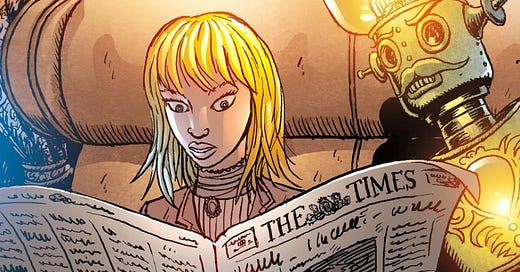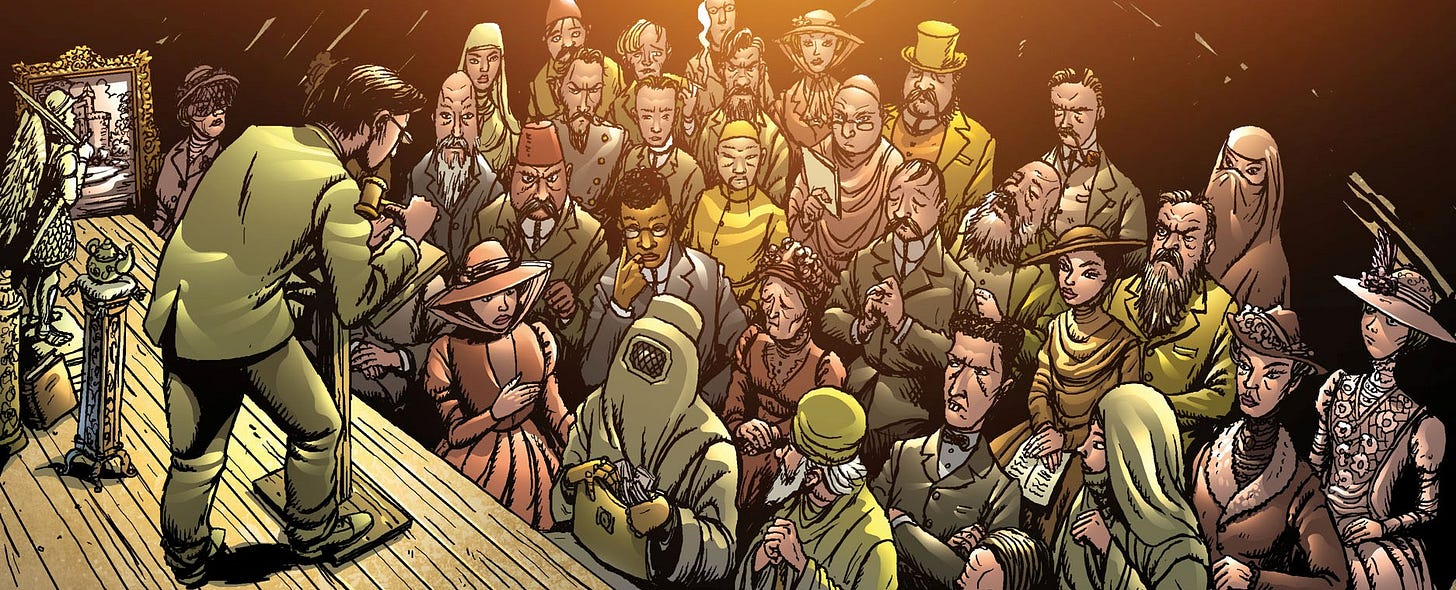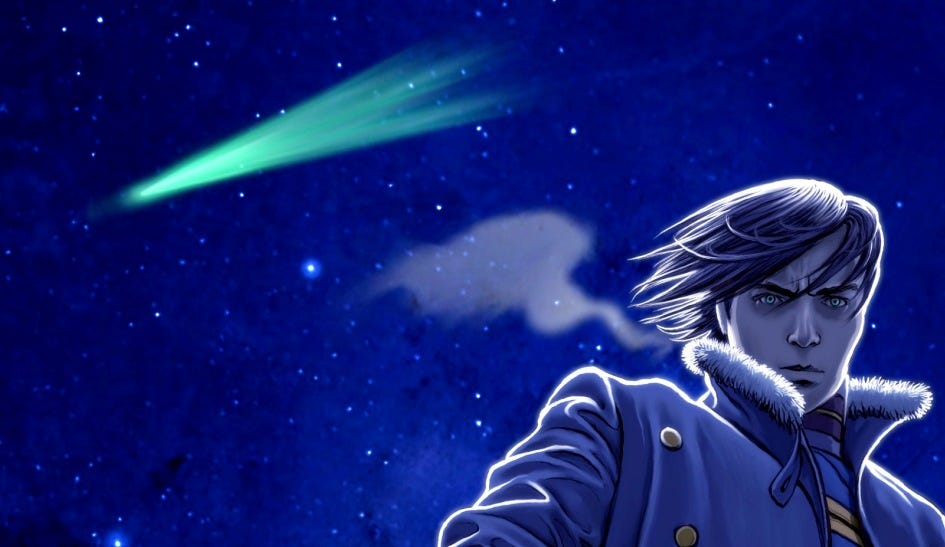How AI could have saved my comic book—and what that means for future creativity
When stories become living worlds
Ten years ago, with great regret, I finally had to call time on my comics saga Mirabilis: Year of Wonders. Working with artists Leo Hartas and Martin McKenna, I had begun Mirabilis as a weekly strip in a short-lived UK comic called The DFC. After that folded, we kept going on fumes to finish the first season (and I mean literal season; Mirabilis was conceived a four-book series covering one year) but it wasn’t sustainable. The art on a comic like that is an immense labour, not just for the primary artists but also for the colouring team. Paying them to complete an entire book would have cost five or six times as much as any advance we could hope for.
How different it would be today, now that we could use AI to help shoulder the burden. And when I say that I’m not talking about AI drawing the whole thing. Comics art goes through a lot of stages: thumbnails, layouts, pencils, inks, flats, final colours. (Not literal pencils and inks these days, of course. We don’t still use cow gum either. But you get the picture.) With AI halving the workload we would have had at least a hope of continuing our story.
Some say: “I won’t buy any comic that uses AI artwork. You’re putting human artists out of a job.” Well, all the artists on Mirabilis ended up out of a job. The writer too. AI could have saved their jobs and the Mirabilis project and we might still be earning royalties on it today. It’s similar to desktop publishing, the new tech of the 1980s, which didn’t so much put typesetters out of work as make it possible for hundreds of thousands of books and magazines to be published that otherwise would never have existed.
In my recent conversation with author Joanna Penn, we talked about how writers can use AI in their work. Comic books are one example. But I’m aware that I’m thinking about this as one who already had a forty-year career in publishing before generative AI showed up. I use AI as a researcher and assistant, much as Cicero was assisted by his slave Tiro or the artists of the Renaissance had a team of people to help paint those intricate ceilings.
Now everything is going to change (which is coincidentally the logline of Mirabilis) as a generation grows up who will never have known a world in which they can’t talk to machines. And agentic machines at that. If we could look forward a decade or two at the writers who have learnt their craft alongside AI, how will they be working?
Some analogies could serve as stepping-stones to help us imagine the future. Here’s one. Baroque composers left plenty of opportunities in their work for performers to improvise. That didn’t mean you weren’t hearing a bona fide Bach piece, just that no two versions were exactly the same. Similarly, why should you get the exact same book as everyone else? Take Mirabilis. It’s set in a year when a green comet appears and dissolves the barrier between fantasy and reality. That’s affecting the whole world, but in the comic we had to settle on a single set of characters and tell one main story. We could only hint at what was going on elsewhere. In the future, a reader might decide to pull away from those characters and go somewhere else, to follow another protagonist, even to get personally involved in the action. Novels might start to bleed into massively multiplayer games – or (as most people prefer to lean back and just be entertained) into something like a fiction-framed reality TV show. It would be like participating in the unfolding saga of Verdopolis “plays” – effectively roleplaying games – with the author, the AI, and yourself as Brontës.
Our author of the future could be thought of more like a creative director, building worlds in which stories happen – virtual versions of something like Westworld. The AI would play the part of most of the characters, which effectively means it’s improvising story threads as those characters respond to the actions, choices, or simply preferences of the reader/viewer/player (oh, we’ll need a whole new vocabulary).
Think of the possibilities. The level of immersion. Reckon you feel an affinity to Lizzie Bennet? What if you could write her a letter? Talk to her? Give her advice? The act of reading would allow you to develop an actual relationship with a story’s characters.
Don’t like the idea? Of course not, you’re an early 21st century reader. But take heart that videogames didn’t replace cinema. Movies didn’t replace theatre. Theatre didn’t replace the bedtime story. Older media will still exist alongside the new forms of drama that weren’t possible until now.
Talking of theatre, I see another use for AI right there. I’m often coming across plays that I’d love to see performed. Jonson’s The Alchemist, for instance, which Coleridge rated as one of the three most perfect plots in literature. It might be years before I’d get a chance to see it on stage – unless some AI power wad the giftie gie us to see it all generated before our eyes. You can already generate audiobooks from your Kindle text. On-the-fly performances of plays are surely far less than a decade away.
What of those who say the AI is taking our jobs? We should care about such things, of course, but we should also argue from an informed position. Writers and artists don’t make a lot of money. Even the famous ones have usually had to find a regular job to finance their creative endeavours. The median income is lousy; it’s only the average that makes writing or illustration look like viable careers, and that average is distorted by the James Pattersons and Tom Clancys and Danielle Steels, author brands that employ an army of ghost writers to churn out the content.
I mentioned my forty-year career, but that’s had its highs and lows. I earned not a penny for writing Mirabilis; it all went on the artists. I’ve sometimes had to use my design work in the videogames industry to subsidize my books. AI will not take income away from writers and artists, because for most of them that income doesn’t exist. The work is a labour of love. Because of AI, more people will now find it possible to indulge that creative yearning.
Let’s look further out. At some point, perhaps soon and perhaps not, we’re going to create AGI – conscious intelligent entities as different from generative AI as we are from parrots. In Fritz Leiber’s novel The Silver Eggheads (1961), books are generated by AI. The machines aren’t interested in the kinds of stories we read today, and in the novel they still need a human author to start them off with a prompt. That’s just like the generative AI of a few years ago. What about AGIs? Will they have their own art? Tell their own stories? We mustn’t jump to conclusions about that. Human interest in storytelling may not be another type of Turing Test but simply a reflection of our tendency as social animals to gossip.
On the other hand, much of art is arguably just expression of the concepts of inheritance, polymorphism, encapsulation, and abstraction – unsurprisingly, as we think symbolically and in terms of a hierarchy of classes of objects. Play is testing and training, useful for survival. All thought experiments are stories of a kind. The aesthetics of art is not subjectively different from the aesthetics of mathematical equations. Presented with an elegant proof, physicists have been known to laugh in delight. Is that because we are social animals or because we are intelligent entities with an updatable model of the world around us?
We expect AGI to be motivated by curiosity, because we’ll build it that way, and manipulating concepts and exploring hypotheticals should follow logically from that. So the AGIs may have art of their own, just not in any form that would be comprehensible to us or to the simpler AIs we work with to create our own art.








It's an interesting possibility, but the other side of this coin is that it would change the rest of the field too, not just your own work. Instead of competing with a few hundred graphic novels that managed to reach the finish line, you'd be competing with hundreds of thousands. Sure, most would be much lower quality, but that means you've swapped one major problem for another.
We can see a bit of this in games, where improved tools have meant vast expansion in the number of titles released. Similarly with the impact of digital distribution on music.
So no, in the future everyone won't be famous for 15 minutes. Instead, production of works will become increasingly easy and visibility (what used to be called "marketing" when it involved actual skills) will be everything.